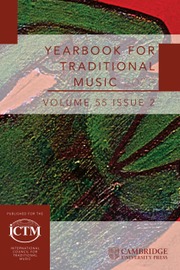Crossref Citations
This article has been cited by the following publications. This list is generated based on data provided by Crossref.
Both, Arnd Adje
2009.
Music Archaeology: Some Methodological and Theoretical Considerations.
Yearbook for Traditional Music,
Vol. 41,
Issue. ,
p.
1.
Citro, Silvia
and
Cerletti, Adriana
2009.
“Aboriginal Dances Were Always in Rings“: Music and Dance as a Sign of Identity in the Argentine Chaco.
Yearbook for Traditional Music,
Vol. 41,
Issue. ,
p.
138.


